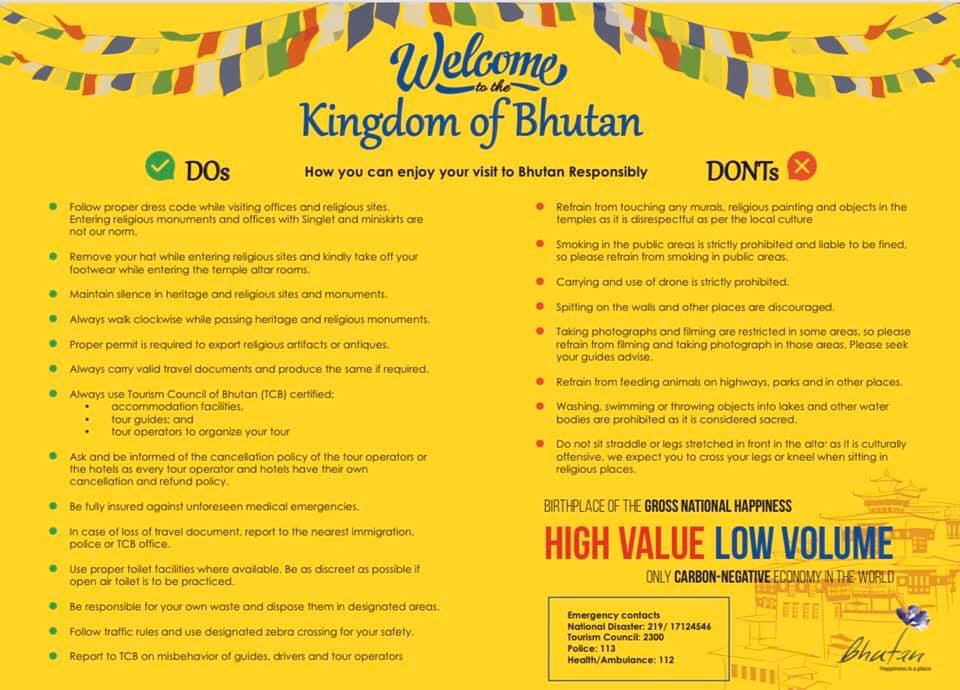
Travelling to Bhutan is like stepping into a living museum of culture, tradition, and spirituality. As a visitor, you’ll be welcomed warmly—but it’s important to understand the Bhutanese etiquette so you don’t accidentally offend or disrespect the deeply rooted customs. To help you navigate Bhutan with grace, here’s a comprehensive list of the most important do’s and don’ts to keep in mind, whether you’re visiting dzongs, trekking through the mountains, or simply interacting with locals.
✅ The Do’s in Bhutan
Do dress modestly, especially when visiting monasteries, temples, and dzongs. Long sleeves, long trousers or skirts, and closed-toe shoes are ideal.
Do remove your hat, sunglasses, and shoes before entering religious buildings or someone’s home.
Do walk clockwise around stupas, prayer wheels, and chortens, keeping them on your right side as a sign of respect.
Do greet monks and elders with a polite bow and a smile. Bhutanese are warm and courteous people—kindness goes a long way.
Do ask before taking photos, especially of people, religious sites, or inside monasteries. Some places strictly forbid photography.
Do use both hands or your right hand when giving or receiving something, especially money or gifts.
Do follow your guide’s lead when visiting sacred or government sites—they’ll help you navigate protocol.
Do respect the environment—Bhutan is fiercely protective of its forests and wildlife. Take nothing but photos and leave no trace.
Do carry small denominations of local currency for tipping and minor purchases, especially in rural areas.
Do try the local cuisine (especially ema datshi) and be open to cultural differences—it’s part of the experience.
Do be punctual for scheduled visits and activities; Bhutanese value timekeeping during official and religious events.
Do be aware of your body language—pointing with fingers or feet can be considered rude.
🚫 The Don’ts in Bhutan
Don’t touch religious artefacts or statues, especially in temples and dzongs—it’s considered disrespectful.
Don’t climb onto or sit on religious monuments, even for photos. These are sacred, not props.
Don’t point your feet towards people, altars, or shrines when sitting—tuck them beneath you or sit cross-legged.
Don’t raise your voice or argue in public—Bhutanese culture values calmness and harmony.
Don’t smoke in public places, especially near monasteries or schools. Smoking is restricted and sometimes banned.
Don’t give sweets or money to children, even if they ask. It encourages begging and goes against Bhutan’s tourism principles.
Don’t expect nightlife or loud entertainment—Bhutan is tranquil by nature; late nights are rare and bars are mellow.
Don’t bring or use drones without prior permission—there are strict regulations due to cultural and security concerns.
Don’t litter, spit, or deface public property. Bhutan places a strong emphasis on environmental cleanliness and respect.
Don’t wear revealing or tight clothing—this includes tank tops, short skirts, or shorts, especially when visiting formal or religious sites.
Don’t enter dzongs or temples during official functions unless permitted—some areas may be off-limits even with a guide.
Don’t assume everyone speaks English fluently, especially in rural areas. Be patient, and your guide will assist.
Bonus Tip: Respect the Gross National Happiness Ethos
Bhutan’s guiding philosophy isn’t about GDP—it’s about Gross National Happiness. That means sustainable tourism, harmony with nature, and cultural preservation matter deeply. By being a mindful and respectful visitor, you’re contributing to the country’s unique way of life.
